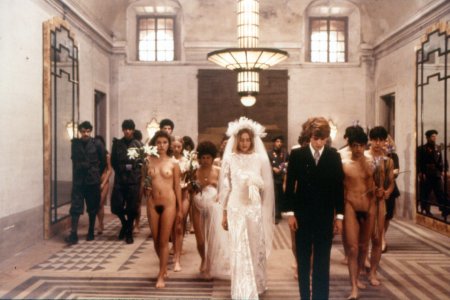LCC lunchtime | Salo o le 120 giornate di Sodoma

In my break today, I had mushroom soup and watched underage girls bathing in faeces, having their nipples burnt and their eyes cut out. I'd got there just in time for the Circle of Blood.
LCC's Sound Art people were making noise alongside Pasolini's film, and have been digitally improvising in the atrium for the past few days. This atrium links the media block to the graphic design block to the central foyer. You could hear the glitch 4 floors up: it's a great working environment.
Anyway, I haven't seen images like this in a long time. Not hearing the dialogue or the screams or the squealches or the gun shots made the hyper-bleak visuals even more stylised. I could eat a bit of ciabatta during the ritualistic slaughter with ease. This feeling reminded me of Holy Mountain.
(Barthes on this stripped glance: Sade-Pasolini.)
Later in the afternoon on my way out I passed through the atrium again, and was asked if I'd like to stop and look at the art work on the wall with a free beer. There were several screen printed posters around, all saying the same thing: Sorry, No Image Available. I declined. I'm too tired for this kind of thing.

3 Comments:
...fuck
You didn't see the torture scene at the end? Interesting censorship history on this classic:
http://www.bfi.org.uk/features/salo/history.html
You should see it the whole way through. It's very powerful. Often viewed as making a point about the inhumanity of fascism. It has a nice nazi flavour.
Pasolini's debut, Acattone (with Bertolucci aged 18 doing what he is actually good at - cinematography) and short in RoGoPag (banned in italy, starred Orson Welles) are both equally important bits of cinema for me. When i think of Salo i also think of Ken Russell's THE DEVILS. Also visually brilliant, blasphemous, conceptually radical and orgysome.
Here's Pasolini on it:
"This film is a cinematographic transposition of Sade's novel The 120 Days of Sodom. I should like to say that I have been absolutely faithful to the psychology of the characters and their actions, and that I have added nothing of my own...
Despite my absolute fidelity to Sade's text, I have however introduced an absolutely new element: the action instead of taking place in eighteenth-century France, takes place practically in our own time, in Salò, around 1944, to be exact.
Still: Salo
This means that the entire film with its unheard-of atrocities which are almost unmentionable, is presented as an immense sadistic metaphor of what was the Nazi-Fascist 'dissociation' from its 'crimes against humanity'."
More here:
http://www.bfi.org.uk/features/salo/foreword.html
Post a Comment
<< Home